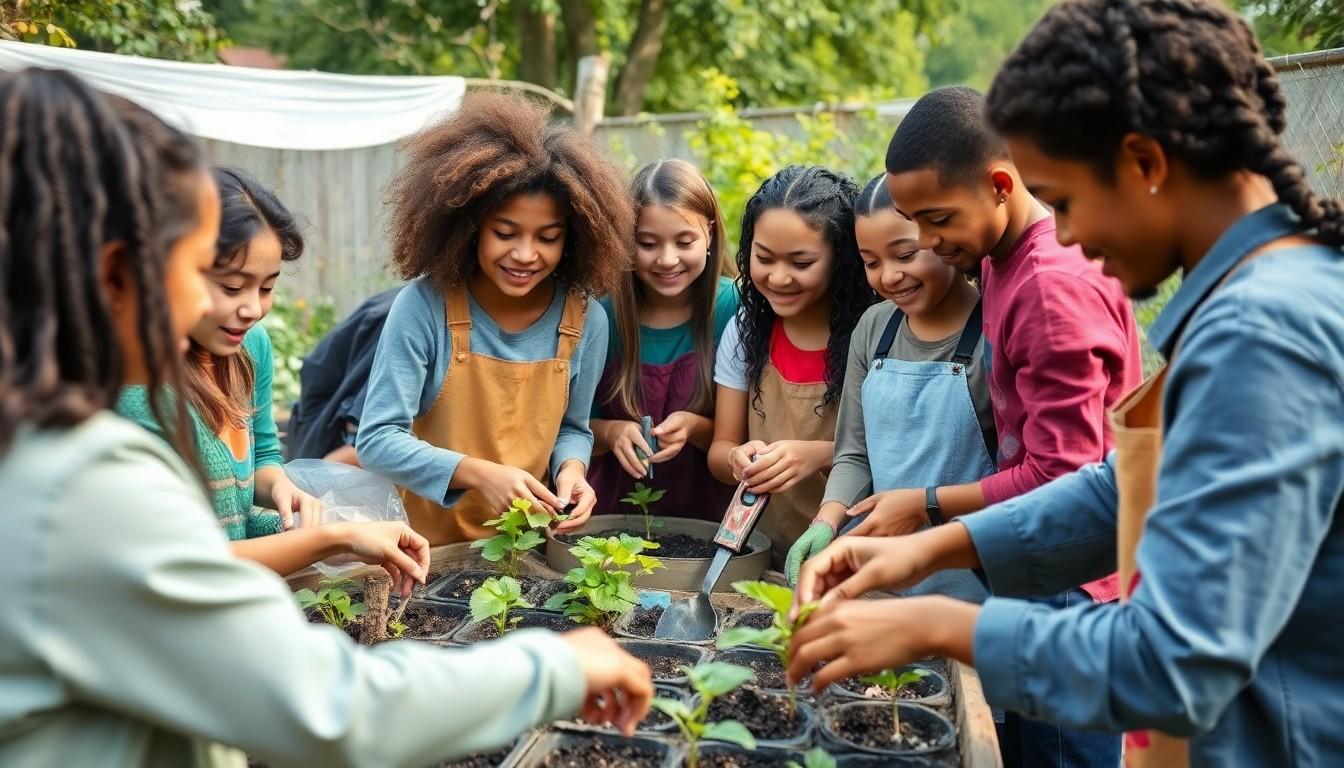In a world where plastic straws are the new villains and recycling bins are the unsung heroes, sustainable living education is more crucial than ever. It’s not just about hugging trees or wearing hemp sandals; it’s about arming ourselves with the knowledge to protect our planet while still enjoying life’s little pleasures. Imagine a future where eco-friendly choices are as easy as choosing between pizza toppings—now that’s a slice of heaven!
Sustainable Living Education
Sustainable living education plays a critical role in fostering eco-consciousness. It emphasizes practical skills, knowledge, and attitudes necessary for individuals to thrive while minimizing environmental impact. Participants learn strategies for reducing waste, conserving energy, and choosing sustainable products.
Programs focus on several key areas. First, community engagement encourages collective action toward environmentally responsible choices. Students explore local resources, fostering connections with local farmers and businesses. Additionally, workshops demonstrate techniques for composting, urban gardening, and using renewable energy sources.
Next, curricula often integrate topics like climate change and biodiversity. These lessons aim to deepen understanding of ecological systems and human influence. Individuals grasp the implications of personal choices through interactive discussions and case studies.
Furthermore, sustainable living education encourages critical thinking about consumer habits. Courses examine the life cycles of products, highlighting environmental footprints. By analyzing the effects of plastic pollution or fast fashion, students appreciate the significance of ethical consumption.
Lastly, educational initiatives target diverse audiences. Children engage in playful activities that instill eco-friendly values early on. Adults benefit from workshops designed to address real-world challenges, such as utility bills and food waste.
Sustainable living education cultivates awareness, empowering individuals to make informed decisions. As knowledge spreads, it fosters community resilience and inspires collective efforts toward a greener future. This commitment positions sustainability as not just an ideal, but a practical way of life.
Importance of Sustainable Living Education

Sustainable living education fosters a culture of eco-consciousness, empowering individuals to make informed choices. By equipping people with essential skills and knowledge, this education lays the groundwork for a more sustainable future.
Environmental Awareness
Environmental awareness serves as a cornerstone of sustainable living education. Understanding concepts like climate change, resource depletion, and biodiversity loss equips individuals with the insights necessary for responsible decision-making. Awareness influences how people perceive their impact on ecosystems. When individuals grasp the consequences of their actions, they become more inclined to adopt sustainable practices. This education emphasizes the necessity of eco-friendly behaviors, from reducing waste to conserving energy. In-depth learning experiences encourage critical discussion about pressing environmental issues. Engaging in these discussions leads to heightened sensitivity toward the planet’s needs and challenges.
Community Engagement
Community engagement enhances sustainable living education by fostering connections among individuals and local resources. Programs that prioritize collaboration build networks that inspire collective action. Participants often work alongside local farmers and businesses, cultivating relationships that support sustainability efforts. Workshops focusing on practical skills like composting and urban gardening create hands-on opportunities for learning. These initiatives cultivate a sense of belonging and responsibility toward the environment. Addressing local challenges encourages participants to brainstorm and brainstorm solutions as a group. Shared experiences promote solidarity, making sustainability a group effort rather than an isolated endeavor. The result is empowered communities ready to tackle environmental issues together, effectively amplifying their impact.
Strategies for Implementing Sustainable Living Education
Integrating sustainable living education involves well-structured strategies. These strategies ensure effective learning while addressing environmental challenges.
Curriculum Development
Establishing an effective curriculum incorporates diverse topics that reflect current environmental issues. Key subjects include climate change, renewable energy, and biodiversity. Teachers should infuse practical skills like composting and urban gardening into lessons. Aligning objectives with community values enhances relevance and engagement. Incorporating hands-on projects fosters connection with local resources, encouraging real-world applications. Collaborating with experts and stakeholders enriches educational material and keeps it current. Overall, a well-rounded curriculum captures the essence of sustainable living, making it accessible to all ages.
Experiential Learning Opportunities
Offering experiential learning opportunities enhances understanding of sustainable practices. Field trips to local farms, recycling centers, and ecological reserves provide firsthand experiences. Participants can engage in hands-on activities like planting trees or creating community gardens. Workshops that emphasize skills like cooking with local ingredients foster deeper connections with food systems. Organizing community clean-up or restoration projects cultivates a sense of ownership towards local environments. Encouraging collaboration among participants nurtures teamwork and inspires further environmental action. These experiences reinforce concepts learned in the classroom, making sustainability an integral part of daily life.
Challenges in Sustainable Living Education
Sustainable living education encounters various challenges that hinder its effectiveness and reach.
Resource Limitations
Resource constraints pose significant barriers to implementing sustainable living education. Limited funding impacts program availability and quality, affecting outreach efforts. Inadequate materials, such as textbooks and practical tools, restrict educators from providing comprehensive learning experiences. Staffing shortages further impede the development of engaging curricula. Many communities lack access to necessary facilities, such as gardens or workshops, essential for experiential learning. Those working at schools or community centers feel overwhelmed without proper financial support or resources. Addressing these limitations fosters a more effective approach to sustainability education.
Resistance to Change
Resistance to change presents another challenge within sustainable living education. Many individuals may doubt the effectiveness of eco-friendly practices or view them as burdensome lifestyle shifts. Some communities hesitate to adopt new methods due to entrenched habits and traditions. Adults often prioritize convenience over sustainability, complicating efforts to teach eco-conscious choices. Misinformation about environmental issues sometimes breeds skepticism, making productive dialogue difficult. Overcoming this resistance requires building trust and understanding among various audiences, emphasizing the long-term benefits of sustainable living practices.
Providing Practical Knowledge
Sustainable living education is essential for nurturing a generation that prioritizes the planet’s well-being. By providing practical knowledge and fostering community engagement, these programs empower individuals to make informed choices.
As people learn about eco-friendly practices and the implications of their actions, they become more sensitive to environmental challenges. This education not only equips them with the skills needed for sustainable living but also inspires collective action and a sense of responsibility.
Addressing the challenges in this field will ensure that sustainable living becomes an integral part of daily life. With commitment and collaboration, the vision of a greener future can be realized, making sustainability a natural choice for everyone.

